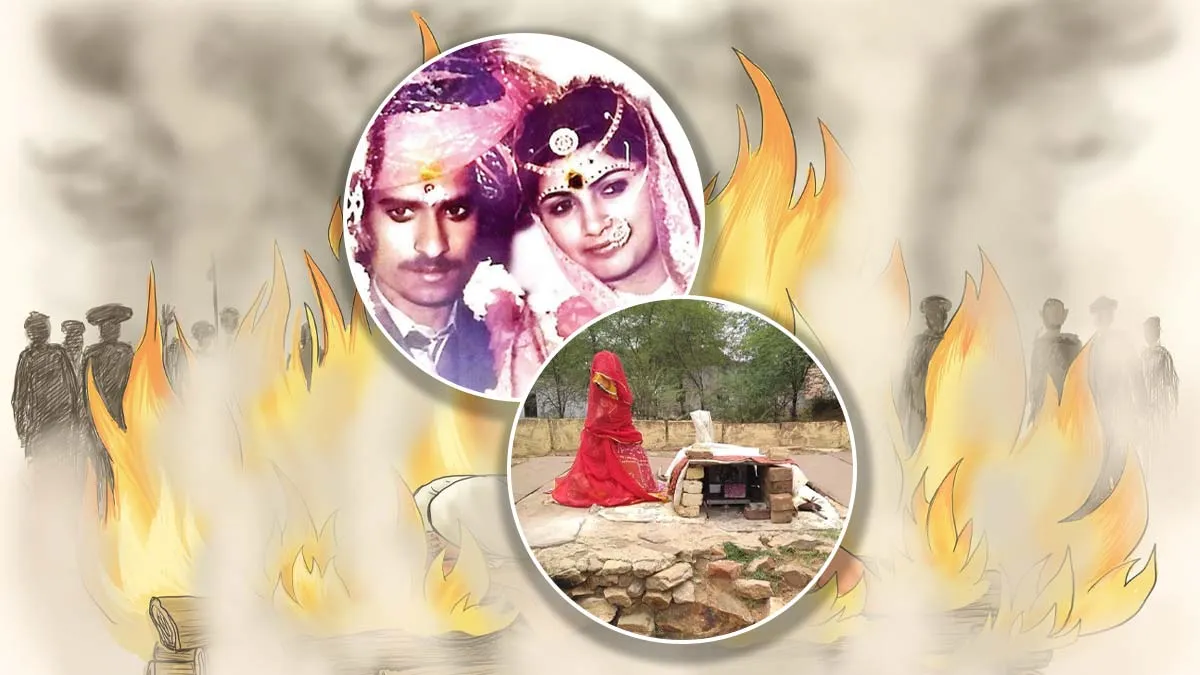
Roop Kanwar Case: Justice for India's Last Sati Victim Remains Unfulfilled
In January 1987, Roop Kanwar married Maal Singh in Divrala village of Sikar district, Rajasthan. She was 18 at the time and Maal was 24. The young couple was embarking on their new journey together when fate took a brutal turn. Eight months later, in September, Singh died in a Sikar hospital due to gastroenteritis and this is where the story begins. After his death, Roop was reportedly made to sit on her husband's funeral pyre and burnt alive under the vile practice of Satipratha. The incident, which took place on September 4, 1987, is apparently India's last known case of sati.
8 Accused of Celebrating Roop Kanwar's 'Sacrifice,' Glorifying Sati, Acquitted
In 1988, 45 people gathered together to celebrate the first anniversary of the "pious" event and allegedly glorified sati. This was in direct violation of Section 5 (punishment for glorification of sati) of The Commission of Sati (Prevention) Act, 1987. The 1987 Act was brought forth after Roop's demise. The punishment for the same is jail time of up to seven years and a fine of up to Rs 30,000.
Of the 45, 25 were let free for lack of evidence in 2004 and eight are dead. Four are absconding while eight were acquitted on Wednesday for, you guessed it, no proof. “To prove the violation of section 5, section 3 (attempt to commit sati) needed to be proved. However, the prosecution, the investigation agency, could not prove section 3 itself, that sati took place. There was no material evidence which could prove that sati took place and that it was subsequently glorified,” advocate Aman Chain Singh Shekhawat, representing the accused, said.
1
2
3
4
He confirmed the court's verdict, and added, "The (Jaipur special) court said that the prosecution could not prove its case beyond doubt, and hence, giving the benefit of doubt to the eight, acquitted them."
Don't Miss: In Pictures: Durga Puja and Modern Women – Celebrating Strength, Resilience, and the Fight for Justice
Women's Groups Want Rajasthan Govt To Appeal Against Acquittal
Several women's organisations have asked the Rajasthan government, led by Chief Minister Bhajan Lal Sharma, to appeal against the verdict and ensure that justice is done. In a strong statement, they jointly said, "It should be known that more than 17 people (we have the cases) were acquitted on 31st January 2004, including those cases which had erstwhile Health Minister Rajendra Singh Rathore, erstwhile Food and Transport Minster Pratap Singh Kachariywaas, senior leaders of the Sati Dharma Raksha Samiti and Rajput Sabha Bhawan Jaipur."
They added that "The GOR (Government of Rajasthan) law Department took a decision to not go in Appeal," even though "the women's organisations went pillar to post trying to see that the acquittal be challenged."
"The trial was most slipshod and neither the Police, the prosecution or the Sati special court Judge in Jaipur, seemed to have done a fair job," the statement highlighted. Signatories of the group comprise the People's Union for Civil Liberties (PUCL), All India Democratic Women’s Association (AIDWA), National Federation of Indian Women (NFIW), and Vividha Women’s Documentation and Resource Centre, among others. Representatives of each emphasized how the acquittal encourages a society's justification to celebrate such barbaric acts.
They pointed out that no government, including the one with Vasundhara Raje as Chief Minister, entertained the idea of challenging the 2004 acquittals. That was despite the trials being full of flaws.
"Successive Rajasthan Governments, including the one led by Ashok Gehlot, also did not change their position which is obvious, as both parties did not wish to antagonise the Rajput vote bank and leaders of both sides were implicated in the case," the women's groups added.
The Rajput vote bank is a notable observation as Divrala has become synonymous with Rajputana pride. Locals often add its name to their own and compare the village to Queen Padmavati, Chittorgarh’s legendary figure, who is rumoured to have self-immolated to save her dignity and avoid capture by Alauddin Khilji’s army.
Don't Miss: The Story Of DSP Shrestha Thakur And Her Battle With Matrimony Betrayal
For more such stories, stay tuned to HerZindagi.
1
2
3
4